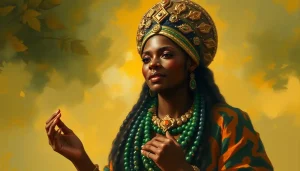Beyond the glittering allure of material wealth lies a powerful Yoruba deity who has guided generations of West Africans in their pursuit of prosperity, wisdom, and abundance. Aje, the Orisha of Wealth, stands as a testament to the rich tapestry of African spirituality and its enduring influence on the lives of millions. Her presence resonates through bustling marketplaces, thriving businesses, and the hearts of those seeking financial stability and success.
In the vibrant pantheon of Yoruba deities, Aje holds a unique and revered position. She embodies the very essence of prosperity, not just in material terms, but in the broader sense of abundance that encompasses wisdom, spiritual growth, and community well-being. As we delve into the world of this fascinating goddess, we’ll uncover the depths of her influence and the timeless lessons she offers to those who seek her guidance.
The Roots of Prosperity: Aje’s Origins and Mythology
Aje’s story is woven into the fabric of Yoruba mythology, a rich tapestry of beliefs that has shaped West African culture for centuries. Unlike some of her more widely known counterparts in the Yoruba pantheon, such as Shango or Oshun, Aje’s influence is often felt more than seen, permeating the very foundations of commerce and wealth creation.
Legend has it that Aje was born from the primordial waters, emerging as a force of nature that could harness the power of abundance. Some stories depict her as a beautiful woman adorned with cowrie shells, a symbol of wealth in many African cultures. Others describe her as a shape-shifter, able to take on various forms to test the character of those seeking her favor.
One particularly captivating tale recounts how Aje challenged the other Orishas to a contest of wealth creation. While her counterparts focused on accumulating physical riches, Aje demonstrated the true nature of prosperity by empowering the community, sharing knowledge, and fostering sustainable growth. This story underscores a fundamental aspect of Aje’s teachings: true wealth extends far beyond material possessions.
In Yoruba art and culture, Aje is often represented by symbols of abundance and commerce. Cowrie shells, as mentioned earlier, feature prominently in her iconography. Market scenes, bountiful harvests, and intricate trade networks are also common motifs associated with this powerful deity. These representations serve as a reminder of Aje’s all-encompassing influence on the economic and spiritual well-being of her devotees.
The Many Faces of Abundance: Aje’s Domains and Attributes
At her core, Aje embodies the multifaceted nature of wealth and prosperity. Her influence extends far beyond the mere accumulation of material possessions, touching upon various aspects of human existence that contribute to a truly abundant life.
First and foremost, Aje is the patroness of wealth and prosperity in its most tangible forms. She oversees the flow of money, the accumulation of assets, and the growth of financial resources. However, her concept of wealth is not limited to individual gain. Aje encourages the circulation of resources within communities, understanding that true prosperity is achieved when it lifts all boats.
Commerce and trade fall squarely within Aje’s domain. She is the unseen force behind successful business ventures, fair exchanges, and mutually beneficial partnerships. Merchants and entrepreneurs often seek her blessing before embarking on new ventures, recognizing her power to open doors and create opportunities.
Perhaps one of Aje’s most valuable gifts is her bestowal of financial wisdom and sound decision-making skills. She guides her devotees towards prudent investments, wise savings practices, and ethical wealth management. This aspect of her influence is particularly relevant in today’s complex financial landscape, where navigating economic challenges requires both intuition and knowledge.
It’s crucial to understand that Aje’s concept of wealth transcends the material realm. She recognizes the importance of spiritual abundance, the wealth of knowledge, and the richness of human connections. In this way, Aje shares commonalities with other goddesses of wealth across cultures, emphasizing the holistic nature of true prosperity.
Honoring the Source: Worship and Veneration of Aje
The worship of Aje is deeply ingrained in traditional Yoruba practices, with rituals and ceremonies that have been passed down through generations. These practices serve not only to honor the deity but also to align oneself with the principles of abundance and prosperity that she embodies.
In traditional Yoruba communities, Aje is often venerated through communal gatherings and festivals. These events typically feature offerings of food, drink, and symbolic items that represent wealth and abundance. Cowrie shells, coins, and fruits are common offerings, each carrying its own significance in the intricate language of spiritual communication.
One of the most important aspects of Aje worship is the concept of reciprocity. Devotees understand that to receive Aje’s blessings, one must also be willing to give. This principle extends beyond material offerings to include acts of generosity, community service, and the sharing of knowledge and skills.
Modern adaptations of Aje worship have evolved to meet the needs of contemporary practitioners, both in Africa and in diaspora communities around the world. Some devotees create personal altars dedicated to Aje in their homes or businesses, incorporating traditional elements alongside modern symbols of prosperity.
Festivals dedicated to Aje continue to play a significant role in many Yoruba communities. These celebrations often coincide with harvest seasons or important economic events, reinforcing the connection between spiritual practices and material well-being. During these festivals, people come together to give thanks for past blessings and to seek Aje’s favor for future endeavors.
Gifts for the Goddess: Aje Goddess of Wealth Offerings
The practice of presenting offerings to Aje is a cornerstone of her worship, reflecting the deep respect and gratitude her devotees hold for her blessings. These offerings are not mere transactions but symbolic gestures that strengthen the bond between the deity and her followers.
Traditional offerings to Aje often include items that represent wealth and abundance in Yoruba culture. Cowrie shells, once used as currency in many parts of Africa, hold a special place in these rituals. Their smooth, white surfaces are believed to channel Aje’s energy and attract prosperity. Other common offerings include coins, honey, palm oil, and various fruits and vegetables, each carrying its own symbolic meaning.
The significance of these offerings goes beyond their material value. For instance, honey represents the sweetness of life and the smooth flow of blessings, while palm oil symbolizes the lubricant that eases the way for success in business ventures. Fruits and vegetables, particularly those that are round or have many seeds, represent fertility and the potential for growth and abundance.
Rituals associated with presenting offerings to Aje often involve specific prayers and incantations. These verbal offerings are just as important as the physical ones, as they express the devotee’s intentions, gratitude, and commitment to using wealth wisely and ethically. Many practitioners believe that the sincerity and purity of one’s intentions are crucial in gaining Aje’s favor.
In modern times, the concept of offerings to Aje has evolved to include more abstract forms of tribute. Some devotees offer their time and skills to community projects or donate to charitable causes in Aje’s name. Others focus on personal development, viewing the cultivation of financial literacy and business acumen as offerings to the goddess of wealth.
It’s worth noting that wealth rituals and offerings are not unique to Yoruba tradition. Many cultures around the world have developed their own practices for invoking divine assistance in matters of prosperity. However, the specific rituals associated with Aje offer a unique window into the Yoruba worldview and their understanding of the relationship between the spiritual and material realms.
Aje in the Modern World: Contemporary Influence and Relevance
Despite the rapid changes brought about by globalization and modernization, Aje’s influence remains strong in contemporary African spirituality. Her teachings on wealth creation, ethical business practices, and community prosperity continue to resonate with people facing the challenges of the modern economic landscape.
In many urban centers across West Africa, traditional shrines dedicated to Aje can be found alongside bustling financial districts. This juxtaposition of ancient wisdom and modern commerce is a testament to the enduring relevance of Aje’s principles. Business owners, from street vendors to corporate executives, often seek her blessings and guidance in their professional endeavors.
The worship of Aje has also found new life in diaspora communities around the world. As people of Yoruba descent have spread across the globe, they’ve carried their spiritual traditions with them, adapting and reinterpreting them in new contexts. In cities like New York, London, and São Paulo, Aje’s presence can be felt in community centers, cultural events, and even in the business practices of entrepreneurs who draw inspiration from their ancestral traditions.
One of the most significant aspects of Aje’s contemporary influence is her emphasis on ethical wealth accumulation and distribution. In an era marked by growing economic inequality and environmental concerns, Aje’s teachings offer a valuable perspective on responsible prosperity. Her followers are encouraged to view wealth not as an end in itself, but as a means to uplift their communities and create sustainable abundance for all.
This ethical dimension of Aje worship has led to interesting collaborations between traditional spiritual practitioners and modern social entrepreneurs. Some organizations have developed microfinance initiatives inspired by Aje’s principles, providing economic opportunities to underserved communities while honoring traditional spiritual values.
The Wisdom of Aje: Lessons for Modern Seekers of Prosperity
As we navigate the complexities of the modern financial world, the teachings of Aje offer timeless wisdom that can guide us towards true prosperity. Her multifaceted approach to wealth reminds us that abundance encompasses more than just material riches.
One of the key lessons we can draw from Aje is the importance of balance in our pursuit of wealth. While she encourages ambition and the desire for material success, she also emphasizes the need for spiritual growth and community responsibility. This holistic view of prosperity can serve as an antidote to the often single-minded focus on financial gain that characterizes much of modern society.
Aje also teaches us about the power of reciprocity and generosity. In her worldview, wealth is not a zero-sum game where one person’s gain must come at another’s loss. Instead, she encourages a model of abundance where sharing and mutual support lead to greater prosperity for all. This principle can be applied in various aspects of our lives, from business practices to personal relationships.
Another valuable lesson from Aje is the importance of wisdom and discernment in financial matters. She reminds us that true wealth is not just about accumulation, but about making smart, ethical decisions with our resources. This teaching is particularly relevant in today’s complex financial landscape, where opportunities and pitfalls often come hand in hand.
Aje’s Legacy: A Continuing Source of Inspiration
As we conclude our exploration of Aje, the Yoruba Orisha of Wealth, it’s clear that her influence extends far beyond the boundaries of traditional West African spirituality. Her teachings on prosperity, ethical wealth creation, and community well-being offer valuable insights for people of all backgrounds seeking to navigate the complexities of modern economic life.
Aje’s enduring legacy in Yoruba and global culture is a testament to the universal human desire for abundance and the deep-seated belief in the connection between the spiritual and material realms. Her story reminds us that wealth, in its truest form, is a holistic concept that encompasses not just financial resources, but also wisdom, community, and spiritual fulfillment.
As we move forward in our own pursuits of prosperity, we would do well to remember the lessons of Aje. Her emphasis on ethical wealth creation, community support, and the circulation of resources offers a model of abundance that is sustainable and enriching for all.
For those interested in delving deeper into the world of divine figures associated with wealth and prosperity, there are many fascinating traditions to explore. From the Egyptian Goddess of Wealth to the Japanese God of Wealth, each culture offers its own unique perspective on the spiritual dimensions of abundance.
In embracing the wisdom of Aje and other spiritual traditions, we open ourselves to a richer, more nuanced understanding of wealth and success. By honoring these ancient teachings while adapting them to our modern context, we can create a more balanced, ethical, and truly prosperous world for ourselves and future generations.
References:
1. Abimbola, W. (1994). Ifa: An Exposition of Ifa Literary Corpus. Oxford University Press.
2. Bascom, W. (1969). Ifa Divination: Communication Between Gods and Men in West Africa. Indiana University Press.
3. Falola, T., & Akinyemi, A. (2016). Encyclopedia of the Yoruba. Indiana University Press.
4. Olupona, J. K. (2011). City of 201 Gods: Ilé-Ifè in Time, Space, and the Imagination. University of California Press.
5. Drewal, H. J., Pemberton, J., & Abiodun, R. (1989). Yoruba: Nine Centuries of African Art and Thought. Center for African Art.
6. Murphy, J. M., & Sanford, M. M. (2001). Osun across the Waters: A Yoruba Goddess in Africa and the Americas. Indiana University Press.
7. Lawal, B. (1996). The Gèlèdé Spectacle: Art, Gender, and Social Harmony in an African Culture. University of Washington Press.
8. Olupona, J. K., & Rey, T. (2008). Òrìşà Devotion as World Religion: The Globalization of Yorùbá Religious Culture. University of Wisconsin Press.
9. Adogame, A. (2007). “Aje: Yoruba Goddess of Wealth in Yorubaland and the African Diaspora.” Journal of African Cultural Studies, 19(1), 79-89.
10. Thompson, R. F. (1983). Flash of the Spirit: African & Afro-American Art & Philosophy. Random House.












Would you like to add any comments? (optional)